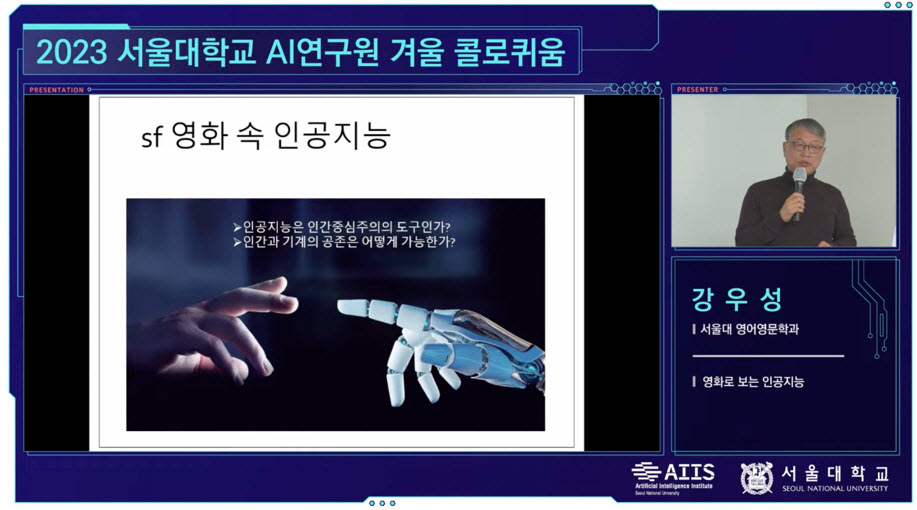On February 23, SNU’s Artificial Intelligence Institute (AIIS) hosted Artificial Intelligence in Film, the third colloquium in its winter series. The guest speaker who took the podium was Professor Kang Woosung (Department of English Language and Literature), whose extensive research interests include film theory and Asian cinema.
Professor Kang acknowledged that the omnipresence of artificial intelligence is simply undeniable in this day and age. It is seen in significant inventions of self-driving vehicles, facial recognition systems, and even the digital assistants that sit innocuously on our kitchen counters. Some have readily embraced artificial intelligence as a tool that enhances the quality of their lives in every imaginable way. Others are much more pessimistic, believing that the unprecedented development and rapidly increasing sophistication of AI technology are a cause for growing apprehension. Film, an art form that offers diverse interpretations of life, naturally depicts these conflicting attitudes.

Professor Kang Woosung on artificial intelligence in science fiction film
Extrapolation as a Rhetorical Device in Science Fiction Films
Accommodating an audience with varying depths of knowledge on science fiction and artificial intelligence, Professor Kang began by introducing the basics. One of the main ingredients and rhetorical ploys of science fiction storytelling is the principle of extrapolation. Professor Carl D. Malmgren of the University of New Orleans defines extrapolation as “a fictional novum by logical projection or extension from existing actualities.” SNU Professor Yi Dongshin (Department of English Language and Literature Department) offers a simpler explanation. In his book, SF, the Genre of Our Age, Professor Yi defines extrapolation as a technique that requires making a certain supposition about our present reality and, by logically extending that supposition, imagining its possible consequence. These presumptions cannot be a figment of our wildest imaginations. They are merely extensions of what is possible in the present and hence plausible to occur in a future time.
One of the more notable instances of extrapolation in science fiction is the space station. 1950s editions of the magazine Collier’s detailed NASA aerospace engineer Wernher von Braun’s visions for space exploration. The text was accompanied by illustrations, among which were those of concept vehicles including a circular space station floating above the Earth. This very image inspired the appearance of Space Station V in Stanley Kubrick’s 1968 film 2001: A Space Odyssey. Considering the existing laws of physics and the direction of technological development, a space station orbiting the Earth was purely theoretical. Imagination became reality two years after the film’s release when construction began on a space station that was successfully launched in 1971.
Anthropocentrism and the Two Sides of Artificial Intelligence
Another concept that is heavily intertwined with artificial intelligence and science fiction is anthropocentrism. Professor Kang broke down anthropocentrism into three points: the assumption of human supremacy, the weighing of all beings against our social and ethical standards, and the belief that everything exists to facilitate humankind in one way or another. In Her, the operating system flawlessly performs secretarial duties and fulfills the emotional wants of the protagonist. A.I. Artificial Intelligence depicts a robotic boy’s unwavering love for his “mother” who has abandoned him and the extreme lengths he is willing to go to win back her affection. Artificial intelligence in science fiction films is often unconditionally accommodating and sacrificial in a way that not even human beings can be. Professor Kang proposed these examples among many more to demonstrate the ironic human desire for artificial intelligence to be “more human than humans.”
Yet, Professor Kang also noted that, on the flip side of the coin, the characterization of artificial intelligence as hostile, revenge-prone beings is just as if not more ubiquitous. Intelligent machines breaking free from the tight rein that humankind has on them to leave terror and destruction in their wake is an all-too-common plotline. 2001: A Space Odyssey, The Terminator, and Ex-Machina are all examples of this theme. Professor Kang argued that the human fear of a future with sentient artificial intelligence is also a direct product of anthropocentrism. There is no way of truly knowing how artificial intelligence may “feel” towards humankind, yet “just as we view anything that may inhibit us from achieving and maintaining dominance in our environment as a threat, we assume that the machines would likewise view us as a limiting factor in their proliferation.”
In summation, Artificial Intelligence in Film provides a different, humanities-oriented perspective to the colloquium series. Instead of focusing on the science behind artificial intelligence, Professor Kang outlined the fundamentals of humankind’s relationship with it and how that manifests in science fiction films, providing much food for thought. He encouraged everyone to reflect upon the following questions. What kind of artificial intelligence does humankind want? Can humans harmoniously coexist with artificial intelligence as it gains greater sophistication and perhaps even sentience one day? Where does artificial intelligence stand in a hierarchy of entities ranging from inanimate objects to human beings? Is it truly reasonable to extrapolate a future in which artificial intelligence threatens our well-being or existence? According to Professor Kang, though there is no way of knowing what lies ahead, perhaps our hopes for and apprehension towards artificial intelligence simply hold up a mirror to human nature.
Written by Hee Seo Lee, SNU English Editor, heeseolee@snu.ac.kr
Reviewed by Professor Travis Smith, Department of the Asian Languages and Civilizations, tlsmith@snu.ac.kr

